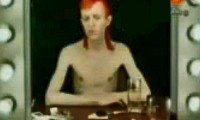Janis Joplin, “Work Me Lord” (Woodstock, August, 1969)
When Janis Joplin took the stage at Woodstock she was already, as one biographer has put it, “three sheets to the wind.” She’d had a drug problem since at least her early twenties. At Woodstock, while she and her band waited ten hours before their set, Joplin allegedly shot up a whole lot of heroin and drank a whole lot of alcohol (presumably Southern Comfort – her booze of choice).
Despite (or perhaps because of) her condition, Joplin’s first performance of the night, “Work Me Lord” is full of the incredible emotional intensity – even the pathos – that Joplin was able to bring to a song. But there’s something chilling about watching the clip now with the benefit of hindsight. A little over a year after this was recorded, Joplin would be found dead in a L.A hotel room, having overdosed on the very drugs that got her so high that night.
Watch closely as she almost drifts out of the moment during the musical interludes. See how she barely keeps it together during the a cappella section. In particular, watch from about 4:56 to 5:22. What exactly happens here? How close did she come to losing the thread completely?
A year or so later – just a few days before her death in fact – Joplin would record ”Me and Bobby McGee,” the only number one hit single of her career. When the song was finally released, Joplin was already dead. “Freedom’s just another word for nothing left to lose.”
When I first heard Joplin sing these words – back when I had a only vague understanding of the details surrounding her life and death – they seemed so perfectly apt, so perfectly her. They also seemed eerily portentous, and I had this moment of awe, as though I’d witnessed an artist with so acute a self-awareness that she’d managed to predict the conclusion of her own story.
Only later did I learn that the song wasn’t written by Joplin at all, but by Kris Kristofferson. In the original Kristofferson version, Bobby McGee was a woman. Only when Joplin sang the song, did Bobby become a man.
Kristofferson and Joplin were once romantically involved, and there’s been speculation that the song was actually about her. He’s denied it – but has admitted that she inspired certain elements of the song, particularly the line: “Somewhere near Salinas, Lord, I let her slip away…”
Over the years ”Me and Bobby McGee” has been recorded by all kinds of artists, from Jennifer Love Hewitt to the Grateful Dead. And along the way the sex of Bobby McGee has ping-ponged back and forth – depending on who’s doing the singing.
But no recording has been as seminal – and as meaningful to me – as Joplin’s posthumously-released 1970 version. Something about it has always chilled me: as though all the melancholy of a liberated yet disconnected life is distilled there within it; as though the pitfalls of true freedom are summed up in this song. And yet who among us hasn’t dreamed of such an existence – despite the loneliness and doom?
I would’ve given a lot to see her sing it. But as far as I know, no video recording of such a performance exists. So all we’re left with is montage: the studio recording over clips of Joplin performing other songs – clips of her when she was still young, burning, and alive – before that October day in 1970, when somewhere near Los Angeles, Lord, we let her slip away…
Janis Joplin, “Me And Bobby McGee: Montage” (1970)
– Kyl Chhatwal




